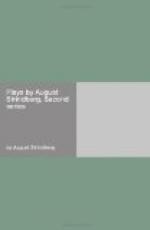ADOLPH. Your words pierce me like knife thrusts, and I fool as if something were being severed within me, but I cannot help it. And this cutting brings a certain relief, too. For it means the pricking of ulcers that never seemed to ripen.—She has never loved me!—Why, then, did she ever take me?
GUSTAV. Tell me first how she came to take you, and whether it was you who took her or she who took you?
ADOLPH. Heaven only knows if I can tell at all!—How did it happen? Well, it didn’t come about in one day.
GUSTAV. Would you like to have me tell you how it did happen?
ADOLPH. That’s more than you can do.
GUSTAV. Oh, by using the information about yourself and your wife that you have given me, I think I can reconstruct the whole event. Listen now, and you’ll hear. [In a dispassionate tone, almost humorously] The husband had gone abroad to study, and she was alone. At first her freedom seemed rather pleasant. Then came a sense of vacancy, for I presume she was pretty empty when she had lived by herself for a fortnight. Then he appeared, and by and by the vacancy was filled up. By comparison the absent one seemed to fade out, and for the simple reason that he was at a distance—you know the law about the square of the distance? But when they felt their passions stirring, then came fear—of themselves, of their consciences, of him. For protection they played brother and sister. And the more their feelings smacked of the flesh, the more they tried to make their relationship appear spiritual.
ADOLPH. Brother and sister? How could you know that?
GUSTAV. I guessed it. Children are in the habit of playing papa and mamma, but when they grow up they play brother and sister—in order to hide what should be hidden!—And then they took the vow of chastity—and then they played hide-and-seek—until they got in a dark corner where they were sure of not being seen by anybody. [With mock severity] But they felt that there was one whose eye reached them in the darkness—and they grew frightened— and their fright raised the spectre of the absent one—his figure began to assume immense proportions—it became metamorphosed: turned into a nightmare that disturbed their amorous slumbers; a creditor who knocked at all doors. Then they saw his black hand between their own as these sneaked toward each other across the table; and they heard his grating voice through that stillness of the night that should have been broken only by the beating of their own pulses. He did not prevent them from possessing each other but he spoiled their happiness. And when they became aware of his invisible interference with their happiness; when they took flight at last—a vain flight from the memories that pursued them, from the liability they had left behind, from the public opinion they could not face—and when they found themselves without the strength needed to carry their own guilt, then they had to send out into the fields for a scapegoat to be sacrificed. They were free-thinkers, but they did not have the courage to step forward and speak openly to him the words: “We love each other!” To sum it up, they were cowards, and so the tyrant had to be slaughtered. Is that right?




